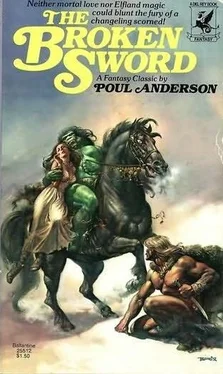Poul Anderson - The Broken Sword
Здесь есть возможность читать онлайн «Poul Anderson - The Broken Sword» весь текст электронной книги совершенно бесплатно (целиком полную версию без сокращений). В некоторых случаях можно слушать аудио, скачать через торрент в формате fb2 и присутствует краткое содержание. Жанр: Фэнтези, на английском языке. Описание произведения, (предисловие) а так же отзывы посетителей доступны на портале библиотеки ЛибКат.
- Название:The Broken Sword
- Автор:
- Жанр:
- Год:неизвестен
- ISBN:нет данных
- Рейтинг книги:3 / 5. Голосов: 1
-
Избранное:Добавить в избранное
- Отзывы:
-
Ваша оценка:
- 60
- 1
- 2
- 3
- 4
- 5
The Broken Sword: краткое содержание, описание и аннотация
Предлагаем к чтению аннотацию, описание, краткое содержание или предисловие (зависит от того, что написал сам автор книги «The Broken Sword»). Если вы не нашли необходимую информацию о книге — напишите в комментариях, мы постараемся отыскать её.
The Broken Sword — читать онлайн бесплатно полную книгу (весь текст) целиком
Ниже представлен текст книги, разбитый по страницам. Система сохранения места последней прочитанной страницы, позволяет с удобством читать онлайн бесплатно книгу «The Broken Sword», без необходимости каждый раз заново искать на чём Вы остановились. Поставьте закладку, и сможете в любой момент перейти на страницу, на которой закончили чтение.
Интервал:
Закладка:
The hardest, most perilous part of his training was in magic. Imric had him wholly in hand for this, once he was ready to go beyond the simple spells that a child could safely use. While he was not able to learn as deeply as his foster father, because of his humanity and short lifespan, he came to be as adept as most elf chieftains. He learned first how to shun and sidestep the iron no elf, troll, or goblin could endure; even when told, and when a gingerly touch on a nail in a yeoman’s house had shown, that he would not be harmed by it, he left it alone out of habit. Next he learned the runes for healing wounds and illness, warding off bad luck, or wishing evil on a foe. He learned the songs which could raise or lay storms, bring good or bad harvests, call forth either anger or peace in a mortal breast. He learned how to coax from their ores those metals, unknown to humans, which were alloyed in Faerie to take the place of steel. He learned the use of the cloak of darkness, and of the skins he could don to take the form of a beast. Near the end of his training he learned the mighty runes and songs and charms which could raise the dead, read the future, and compel the gods; but save in time of direst need no one cared to be shaken to his inmost being by these and risk the destruction they could wreak on him.
Skafloc was often down by the sea, he could sit hour upon hour looking out over its restlessness to the hazy line where water met sky, he never wearied of its deep voice or its tang of salty depths and windy reaches or its thousand moods. He came of a seafaring breed, and the tides were in .his blood. He spoke to the seals in their grunting, barking tongue, and the gulls wheeled overhead to bring him news from the earth’s ends. Sometimes when he was in company with other warriors, the sea maidens would rise from the foam, wringing out their long green hair as they came up on to the strand, and then there would be merriment. They were cool and wet to the touch and they smelled of kelp; afterward Skafloc would have a faint fishy taste on his lips; but he liked them well.
At fifteen years of age he stood nearly as tall as Imric, broad of shoulder and taut of sinew, with long hair flaxen against brown skin. He had a straight, blunt, strong-boned face, a wide mouth quick to smile, large deep-blue eyes set well apart. A mortal without his schooling would have said that a mystery hung over him, veiling itself behind those eyes, which bad looked on more than common mankind saw, revealing itself in that leopard gait.
Imric said to him: “Now you are big enough to be given your own weapons rather than old ones of mine, and also I have been summoned by the Elfking. We will fare overseas.”
At this Skafloc whooped, cartwheeled out into the fields, and galloped his horse madly through the lands of men, making magic out of sheer need to do something. He caused pots to dance on the hearth and bells to ring in the steeples and axes to cut wood of their own accord, he sang cows up onto the crofter’s roof and a wind into being which scattered his hay over the shire and a rain of gold out of the sky into his yard. With the Tarnkappe about his shoulders, he kissed the girls working at twilight in the fields and rumpled their hair and tossed their men into a ditch. For days thereafter, masses were sung to halt the spate of witchcraft; but by that time Skafloc was at sea.
Imric’s black longship sped with her sail taut to a wind he had raised. His crew was of picked elf warriors, for the chance of meeting trolls or kraken was not to be ignored. Skafloc stood by the dragon prow peering eagerly forward; he had been given witch-sight early in his life and could see by night as well as by day. He spied porpoises, silver-grey under the moon, and hailed an old bull seal he knew. Once a whale broached, water roaring off its flanks. Things which mortal sailors only glimpsed or dreamed were plain to the cloudy slant elf-eyes and to Skafloc: the sea maidens tumbling in the foam and singing, the drowned tower of Ys, a brief gleam of white and gold and a hawk-scream of challenge overhead—Valkyries rushing to some battle in the east.
Wind sang in the rigging and waves roared at the strakes. Ere dawn the vessel had reached the other shore, been drawn up on the beach and hidden by spells.
The elves took shelter beneath an awning across the hull, but Skafloc was about during much of the day. He climbed a tree and looked in wonder at the plowlands rolling southward. The buildings here were not like those in England. Among them was the gaunt grey hall of a baron. Skafloc thought with brief pity of the narrow lives that flickered in its gloom. He would not trade.
When night came, the elves mounted the horses they had brought and rode storm-swift inland. By midnight they were in mountain country where the moonlight cast thin silver and thick shadows on crags, cliffs, and the far green shimmer of glaciers. The elves rode along a narrow trail, harness chiming, lances high, plumes and capes streaming. Hoofbeats rang on the stones and echoed back through the wilderness night.
A horn sounded hoarsely from above, another from below. The elves heard a clank of metal and a tramp of feet. When they came to the end of the trail they saw a dwarf troop on guard at a cave mouth.
The bandy-legged men scarce came to Skafloc’s waist, but they were broad of shoulder and long of arm. Their dark, bearded faces were angry; their eyes smouldered beneath tangled brows. They held swords, axes, and shields of iron. But against these the elves had prevailed in the past, by spears and arrows, by speed and agility, and by making craftier plans.
“What will you?” boomed the leader. “Have the elves and trolls not wrought us enough ill, harrying our lands and bearing our folk off as thralls? This time our force is larger than yours, and if you come nearer we will slay you.”
“We come in peace, Motsognir,” replied Imric. “We wish only to buy of your wares.”
“I know your trickery, Imric the Guileful,” said Motsognir harshly. “You would put us off our guard.”
“I will give hostages,” the elf-earl offered; and this the dwarf king grudgingly accepted. Leaving several of the newcomers disarmed and surrounded, Motsognir led the others down into his caverns.
Here fires lit the rock walls with bloody shadow-beset dimness, and over their forges the dwarfs laboured unceasingly. Their hammers rang and clattered until Skafloc’s head belled in answer. Here were made the trickiest works of all the world, goblets and beakers encrusted with gems, rings and necklaces of ruddy gold intricately fashioned; weapons were beaten out of metals torn from the mountain’s heart, arms fit for gods—and indeed the dwarfs had done work for the gods—and other weapons laden with evil. Mighty were the runes and charms the dwarfs could grave, and baffling were the arts they had mastered.
“I would have you make an outfit for my foster son here,” Imric said.
Motsognir’s mole-eyes searched Skafloc’s tall form in the wavering light. His voice rumbled through the hammer-clang : “Well, are you up to your old changeling tricks again, Imric? Someday you will overreach yourself. But since this is a human, I suppose he will want arms of steel.”
Skafloc hesitated. The wariness of years was not overcome at once. But he had known what was coming. Bronze was too soft, the curious elf-alloys too light, to make full use of his growing strength.
“Aye, steel,” he said firmly.
“Tis well, ’tis well,” growled Motsognir, and turned to his forge. “Let me tell you, boy, that you humans, weak and short-lived and unwitting, are nonetheless more strong than elves and trolls, aye, than giants and gods. And that you can touch cold iron is only one reason. Ho!” he called. “Ho, Sindri, Thekk, Draupnir, come to help!”
Читать дальшеИнтервал:
Закладка:
Похожие книги на «The Broken Sword»
Представляем Вашему вниманию похожие книги на «The Broken Sword» списком для выбора. Мы отобрали схожую по названию и смыслу литературу в надежде предоставить читателям больше вариантов отыскать новые, интересные, ещё непрочитанные произведения.
Обсуждение, отзывы о книге «The Broken Sword» и просто собственные мнения читателей. Оставьте ваши комментарии, напишите, что Вы думаете о произведении, его смысле или главных героях. Укажите что конкретно понравилось, а что нет, и почему Вы так считаете.











